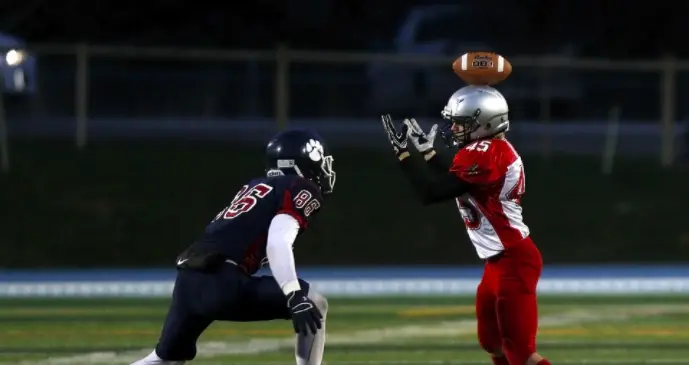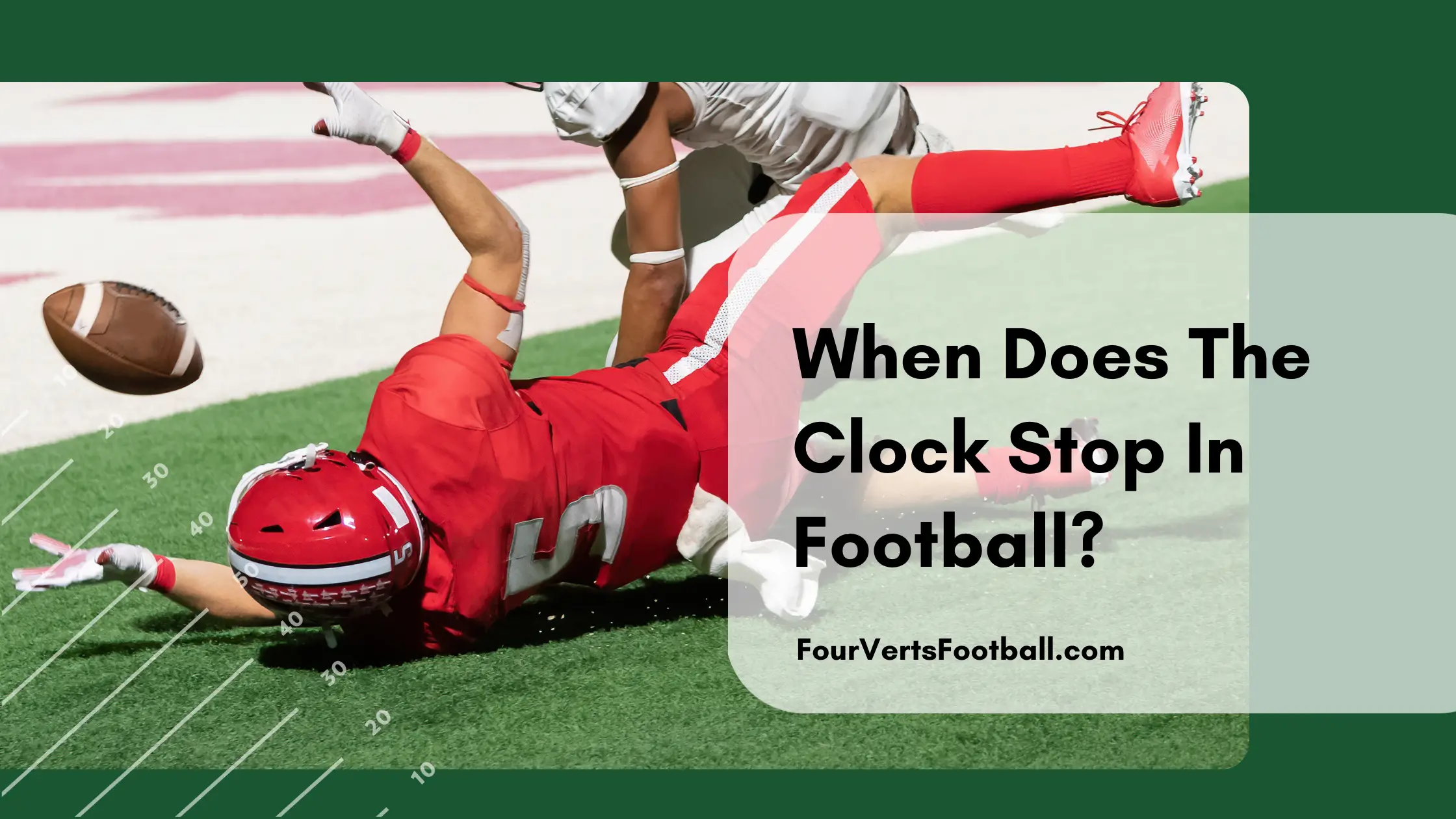If you are anything like most football fans you probably feel like you have a pretty good grasp of the rules of the game. That is until you watch a player run out of bounds during a game and the clock keeps running.
The rules of the clock in football can be complicated. But don’t be worried, this guide is going to break down everything you need to know about when the clock stops in football.
In football, the clock stops for all the following reasons:
- A pass goes incomplete
- A player travels out of bounds with 2 minutes or less remaining in the first half or five minutes or less remaining in the second half
- A Change of possesion occurs
- After any score
- After any timeout or challenge
- A player is injured
Out of Bounds
Going out of bounds seems to be the one rule regarding clock stoppage that has fans confused. Luckily the rule regarding time stoppage when going out of bounds isn’t too confusing.
When a player goes out of bounds the clock is only to come to a stop if there are fewer than two minutes remaining in the first half or fewer than five minutes remaining in the second half.
Yes, that’s right the clock is not stopped each time a player goes out of bounds. But to be fair there are a few reasons why you likely believed that statement to be true.
First off the referee stops the clock briefly whenever a player runs out of bounds.
That is until the ball is reset at the line of scrimmage and the play is whistled to continue. This means you will likely see the clock stop for a few seconds when a player goes out of bounds. Even if it isn’t in the final minutes of a half.
The difference is that once the ball is set, the play clock will start ticking again. The second reason most fans don’t know this rule is because you are mostly only looking at the clock when it matters.
It’s easy to not notice a stoppage of the clock in the first quarter. But when time is ticking down in the half it is likely you are keeping a close eye on the clock.
Additionally, if a player travels out of bounds towards his own goal line the clock will keep running. This is why you may notice players who are looking to kill the clock take a step or two backwards as they travel out of bounds.
If it is in the final few minutes of the half this will allow the ball carrier to keep the clock running despite travelling out of bounds.
Incomplete Pass
An incomplete pass is another play that is going to stop the clock. It does not matter what time in the game an incomplete pass occurs it will always stop the clock.
It also does not matter the way that the incomplete pass occurs. If it is thrown out of bounds, dropped, or jarred loose by a defender all of these plays stop the clock.
This is why you will see the method of spiking the ball used when a team is looking to stop the clock.

Change Of Possession
Another play in football that is going to stop the clock is a change of possession. A change of possession occurs whenever one team has possession of the ball on offense and then turns it over so the other teams offense now has the ball.
This includes all types of turnovers such as interceptions, fumbles, and turnovers on downs. Regardless of the turnover, this will always result in a stop of the clock.
Scores
Scores are a rather obvious example of a situation in which the clock would stop. Having the clock run while the team celebrates and the stadium plays the fight song doesn’t make much sense.
That is why you will find the clock is always stopped after each and every score.
Timeouts And Challenges
Timeouts and challenges are two more factors that are going to stop the clock. These are a little trickier because timeouts and challenges both are decisions that are made by the coach.
Timeouts are typically used for the very purpose of stopping the clock. When you make a play inbounds late in the game and need to stop the clock a timeout will come in handy.
A challenge on the other hand is used when the referees make a call that you do not agree with. Since it often takes a while for these plays to be reviewed the clock is stopped in the interim. If the challenge fails the team is charged a timeout for stopping the clock.
Injuries
The final article on our list of clock stopping actions in football is injuries. This is a fairly obvious clock stoppage as well. Due to the length of time it can take to deal with an injury.
When a player is severely hurt the last thing you want to do is rush his medical process in order to get the game back on. To avoid this the clock comes to a stop when a player is injured on the field.
Though since stopping the clock can be advantageous to your team some rules had to be put in place regarding clock stoppages and injuries.
If a player is injured with fewer than two minutes left in the half then his team is forced to use one of their timeouts.
If a team has a player go down with an injury within fewer than two minutes left they will be charged a penalty if there are no remaining timeouts. The penalty on the defense will come in the form of yards. And when against the offense this penalty will be a ten-second run-off of the clock.
Why Is Stopping The Clock So important?
In a football game, there is going to be fourty eight minutes of game time on the clock. With a maximum of fourty seconds burned between each play, many fans wonder why stopping the clock is so important.
The reality is that there are really only two situations in which a team is going to care about the clock being stopped.
Looking To Run Out The Clock
One situation in which teams are going to care about the clock being stopped is when holding a lead late in the game. If this team is in possession of the ball they are going to attempt to burn as much of the clock as possible.
Oftentimes when it comes to this point in the game the defense will play quite aggressive in an attempt to force the team to punt after three plays.
If they are able to force a team into a three and out then they are only going to have three chances to run the clock out. This makes a play that stops the clock quite important.
Additionally, this sort of situation happens when there are only a few minutes left in the game.
If a team runs an offensive play that doesn’t stop the clock it is going to give the opposing team noticeably more time to even the score.
If a team runs a play that will keep the clock going it will also force their opponents to use a timeout if they still have one. Forcing the use of timeouts is beneficial as this means the opposing team will no longer be able to use them on a drive of their own.
Looking For A Late Comeback
The other instance in which stopping the clock is important is when a team is looking for a late comeback.
Oftentimes this is referred to as the two-minute drill as teams practice attempting to make comebacks similar to this as the clock ticks down.
When a team is on a drive looking to score as the clock winds down they are going to put a major focus on stopping the clock.
This is why you will notice these drives will almost never feature handoffs to the running back. When the ball is handed off the back is tackled inbounds the vast majority of the time.
This means the clock is going to stay running between plays. This is why these drives are going to feature a large number of passes towards the sideline.
Running out of bounds is going to stop the clock which is why most teams will throw passes near the sideline. When a long pass is completed in-bounds teams will either rush to call a timeout or spike the ball in order to stop the clock.
That’s all on stopping the clock in football check out our guide to clocking the ball in football or learn about clock management.


At the beginning, 6 reasons were given for stopping the clock. My question is – what about when a penalty called? Should that be added the reasons? Although it’s only for a few seconds or so, the clock does stop;)